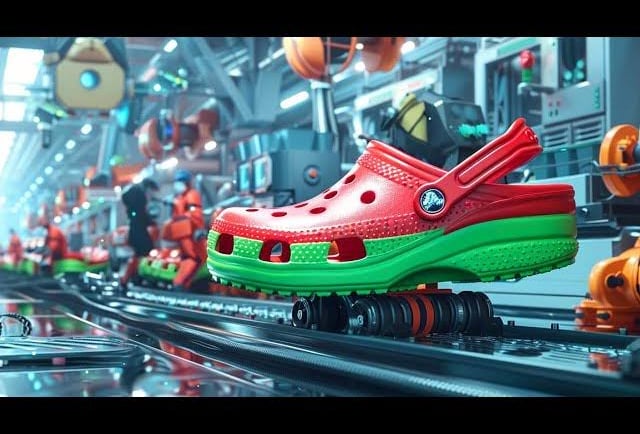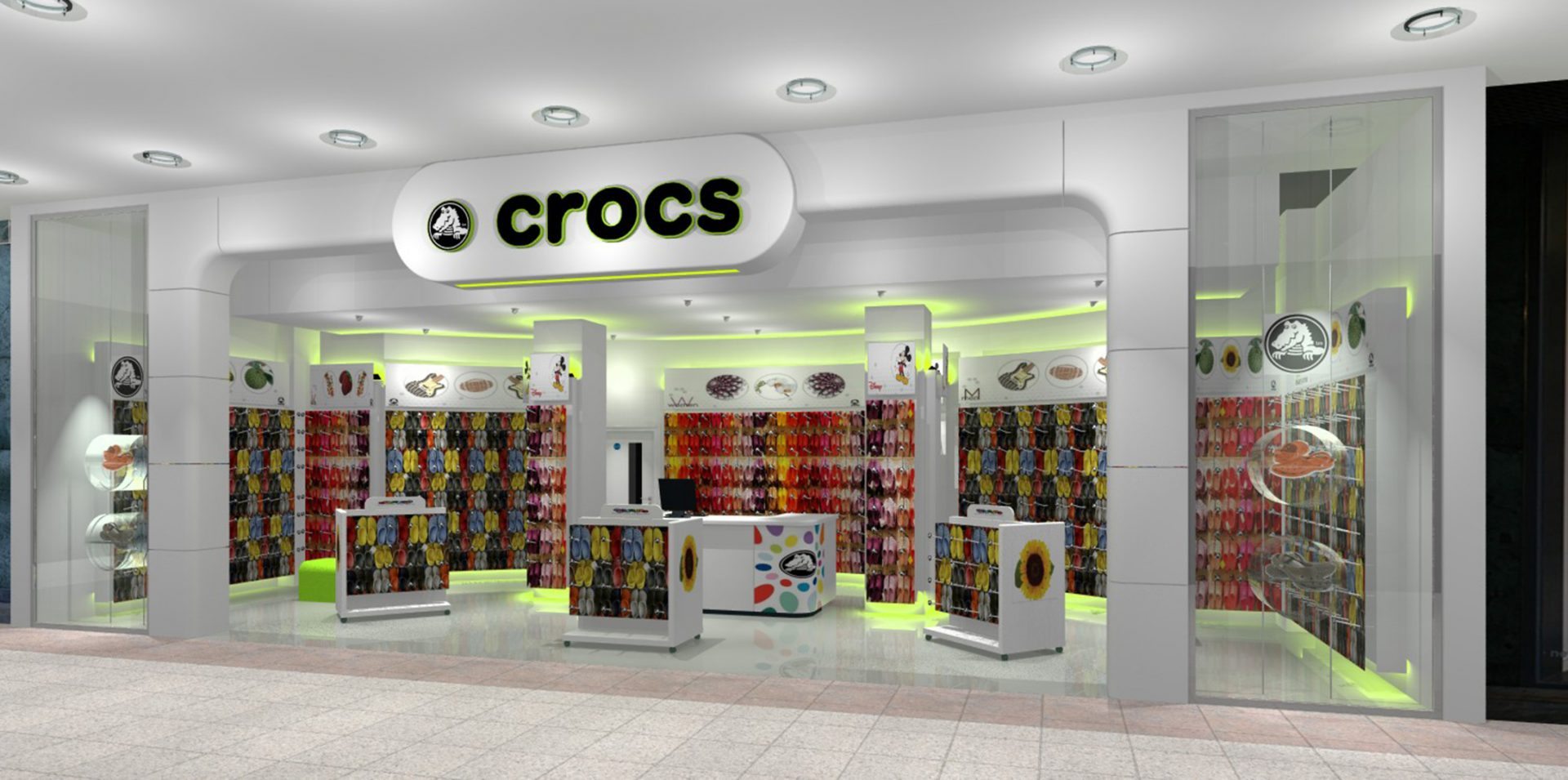👟 Welcome to Crocsy Vibe – Where Comfort Meets Global Style! 🌈
Behind the Scenes: Crocs Manufacturing & Sustainability
See how Crocs are made! Discover the blend of tech, creativity, and eco-conscious steps behind every pair. From bio-based Croslite to sustainability programs, learn how each Crocs shoe is designed for comfort, quality, and a greener future.
SHARAD RAJGURU
7/22/20258 min read


Introduction to Crocs Manufacturing
Crocs, a brand that has become synonymous with comfort and a casual lifestyle, emerged in the early 2000s and has steadily gained worldwide popularity. Initially launched as a boating shoe, Crocs have expanded their product range to include a variety of styles, catering to diverse customer preferences. From classic clogs to sandals and more fashionable collaborations, the brand has evolved its designs while maintaining the fundamental principles of comfort and practicality that define its identity.
The unique material, Croslite™, is at the heart of Crocs’ manufacturing innovation. This lightweight and cushioning material offers not only comfort but also durability and ease of maintenance, making it an attractive choice for consumers. With a focus on versatility, Crocs have been able to penetrate various market segments, appealing to everyone from healthcare professionals to outdoor enthusiasts and fashion-forward individuals. The brand’s ability to blend functionality with style has solidified its position as a leader in the global footwear market.
Moreover, Crocs’ manufacturing processes are characterized by a commitment to sustainability and eco-friendliness. The company has made considerable efforts to minimize its environmental impact, integrating innovative practices into its production methods. This dedication to sustainable manufacturing enhances the brand’s appeal in an age where consumers are increasingly conscientious about the environmental implications of their purchases. Understanding the intricate processes behind their products reveals not only the technological advancements Crocs employs but also the brand's commitment to remaining a responsible player in the industry.
By exploring the manufacturing processes that underpin the Crocs brand, we gain insight into how this iconic footwear has garnered a dedicated following and continues to evolve in a competitive landscape. This examination will highlight the unique practices that not only distinguish Crocs from its competitors but also showcase its contribution to sustainable fashion in the footwear industry.
Croslite Technology: The Heart of Comfort
Crocs is internationally recognized for its unique footwear, which owes much of its distinctive comfort and functionality to Croslite technology. This proprietary material is a closed-cell resin that is engineered to provide lightweight durability, support, and cushioning, setting Crocs apart from conventional footwear materials. The production of Croslite begins with the careful blending of resin pellets, which are then heated and molded to create various styles of footwear. The result is a product that is both flexible and resilient, facilitating natural foot movement while reducing overall strain.
One of the significant benefits of Croslite is its lightweight nature, contributing to a comfortable walking experience. Unlike traditional rubber or plastic, Croslite is designed to minimize weight without sacrificing structural integrity. Additionally, its closed-cell makeup not only allows for easy cleaning and quick drying but also provides a certain level of waterproofing, making Crocs ideal for both leisure and utility purposes.
Moreover, Croslite technology enhances the overall ergonomics of Crocs footwear. The cushioning effect offered by this material helps in distributing weight evenly across the foot, reducing the risk of soreness and exhaustion even after long periods of wear. This focus on comfort and supportive design reflects Crocs' commitment to quality, attracting a wide array of customers, from casual wearers to professionals in demanding environments.
As part of Crocs’ dedication to sustainability, Croslite technology can also play a crucial role in reducing their environmental footprint. The longevity of the footwear, combined with the potential for recycling initiatives, ensures that Crocs can provide comfort that lasts while also considering ecological impacts. This innovative approach continues to position Croslite technology at the forefront of comfort and sustainability within the footwear industry.
Automated Manufacturing Process
The manufacturing process of Crocs is a testament to innovation and efficiency, largely attributed to advanced automation techniques. Crocs utilizes a combination of cutting-edge technology and traditional craftsmanship to produce their signature footwear, ensuring high-quality standards while maximizing output. At the core of this automated manufacturing process is the revolutionary production line, where robots and automated systems facilitate various stages of manufacturing, from material handling to final assembly.
Initially, raw materials are gathered and prepared for the production process. The use of precision machinery allows for the accurate measurement and mixing of Croslite, the proprietary resin material that gives Crocs their unique comfort and durability. Once the material is ready, it is injected into molds through automated processes, ensuring uniformity and reducing the likelihood of human error. This method not only speeds up production but also significantly enhances the precision of each pair made, a critical factor in maintaining quality assurance.
Following the injection phase, the molded footwear undergoes a stringent inspection process that leverages automated quality control measures. These systems are designed to detect defects and inconsistencies at an early stage, allowing for immediate corrective action. Another noteworthy aspect is the use of robotic arms for assembly, which facilitate the integration of components efficiently. This integration of robotics with skilled craftsmanship exemplifies how Crocs seamlessly blends traditional techniques with modern technology, producing high-quality footwear at an impressive scale.
Additionally, automation in the manufacturing process contributes to sustainability goals as well. By optimizing workflows and reducing waste through precise material handling, Crocs minimizes its environmental footprint. As such, the automated manufacturing processes not only elevate efficiency but also underscore the brand’s commitment to sustainable practices across its production lines, ensuring that each pair of Crocs embodies both innovation and responsibility.
Quality Control Measures
Quality control is a critical aspect of Crocs' manufacturing process, ensuring that each pair of shoes meets established standards for durability and comfort. To achieve these high standards, Crocs employs a comprehensive quality assurance framework that spans the entire production line. This framework consists of several key steps, including thorough testing procedures and meticulous inspection protocols.
At the onset of manufacturing, Crocs implements stringent material inspections. Every batch of materials, including the proprietary Croslite™ foam, undergoes rigorous tests to assess their physical properties. These inspections are vital to confirm that the materials can withstand daily wear and provide the desired comfort levels. In addition, initial prototypes are produced and evaluated for functionality, aesthetics, and overall performance.
Throughout the production process, Crocs maintains consistent quality checks. This includes monitoring the manufacturing equipment to ensure it operates correctly and produces items that conform to design specifications. Quality control inspectors are assigned at various stages of production to evaluate newly produced models against established benchmarks. They focus on aspects such as stitching integrity, color consistency, and fit.
Moreover, Crocs has developed a robust final inspection protocol. Before any pair is packaged and shipped, it is subject to a comprehensive quality evaluation, which assesses overall appearance, physical condition, and comfort. This thorough assessment reduces the likelihood of defects and increase customer satisfaction. By prioritizing quality control, Crocs not only upholds its commitment to producing reliable footwear but also reinforces its brand integrity among consumers.
In essence, the emphasis Crocs places on quality control measures is essential for ensuring that its products meet and exceed customer expectations in terms of both durability and comfort.
Sustainability Initiatives
Crocs demonstrates a significant commitment to sustainability, deeply rooted in the brand's operations and manufacturing processes. At the core of these initiatives is a focus on minimizing environmental impact while promoting responsible consumption. One of the key strategies implemented by Crocs involves the integration of bio-based materials into their product lines. These materials are designed to reduce reliance on fossil fuels and contribute to a more sustainable future by lowering greenhouse gas emissions during production.
In addition to the use of eco-friendly materials, Crocs has embarked on various recycling programs aimed at extending the lifecycle of their products. Customers are encouraged to return their old Crocs through dedicated initiatives, which enable the brand to effectively manage waste and promote circularity. The collected shoes are repurposed, helping to reduce landfill waste and ensure that materials are utilized to their fullest potential. This circular economy approach is vital in fostering a sustainable attitude toward footwear consumption.
Moreover, Crocs actively seeks to minimize waste in its manufacturing facilities by adopting lean production methods and optimizing resource use. By improving process efficiencies, the brand not only reduces overall waste but also lessens energy consumption, further enhancing its sustainability profile. These operational changes reflect a broader trend within the industry, emphasizing the importance of responsible manufacturing practices.
The commitment to sustainability at Crocs extends beyond mere compliance; it’s an integral part of the brand's mission to protect the environment while delivering comfortable, versatile footwear. By prioritizing eco-friendly initiatives, Crocs is setting a benchmark within the footwear industry, paving the way for others to follow in the pursuit of sustainability. Ultimately, these efforts contribute to a healthier planet, reinforcing Crocs’ position as a leader in responsible retailing.
The 'Keep It Going' Program: Supporting Circular Fashion
Crocs has launched the 'Keep It Going' program, an initiative aimed at promoting circular fashion and reducing waste within the footwear industry. This program underscores Crocs’ commitment to sustainability and seeks to create a more environmentally responsible approach to product life cycles. The primary goal of the 'Keep It Going' program is to minimize landfill waste through an innovative recycling scheme that encourages consumers to return their used Crocs products instead of disposing of them.
At its core, the program invites consumers to bring back their old and worn-out Crocs, facilitating an efficient recycling process. Once returned, these shoes are either upcycled or recycled into new materials that can be utilized in the creation of new footwear. This practice not only extends the life of materials but significantly minimizes the environmental impact caused by the disposal of footwear. By participating in this initiative, consumers play an integral role in fostering a circular economy that prioritizes the use of sustainable resources and reduces textile waste.
Furthermore, the 'Keep It Going' program yields considerable benefits for those who engage with it. Consumers who return their Crocs can receive incentives, such as discounts on future purchases, thereby making it financially appealing to contribute to sustainability efforts. The program also strengthens community engagement by raising awareness about the importance of recycling and responsible consumption. As more people join the movement, the cumulative impact can lead to a substantial reduction in the ecological footprint associated with footwear.
In conclusion, the 'Keep It Going' program represents a significant step forward for Crocs in its mission to support circular fashion practices. By empowering consumers to actively participate in sustainability efforts, this initiative not only helps in waste reduction but also fosters a community commitment to environmental stewardship.
Conclusion: A Commitment to Comfort and the Planet
In reflecting on the innovative manufacturing processes employed by Crocs, it becomes evident that the brand is firmly committed to both quality and sustainability. The use of advanced materials and techniques not only enhances the comfort for which Crocs is renowned but also minimizes the environmental impact traditionally associated with footwear production. With a focus on efficiency and reduction of waste, Crocs stands out as a leader in adopting sustainable practices within the fashion industry.
Choosing Crocs is more than just selecting a comfortable shoe; it represents a conscious decision to support a brand that actively values the planet. The company's ongoing efforts to incorporate recycled materials and reduce its carbon footprint underline a broader commitment to environmental stewardship. By prioritizing sustainability in its sourcing and manufacturing processes, Crocs is setting a precedent for responsible business practices in the fashion sector.
Furthermore, the commitment to innovation does not compromise the classic appeal and functionality of Crocs. The unique design and versatility of their products demonstrate that sustainability can go hand-in-hand with style and comfort. This dual focus is essential as consumers increasingly seek out options that align with their values, particularly regarding sustainable fashion choices. The shift towards more ethical consumption is increasingly significant in today's market, and companies like Crocs play an instrumental role in this movement.
Ultimately, as we become more conscious of our purchasing decisions, it is imperative to consider the impact of our choices. Supporting brands that prioritize sustainability contributes to a larger narrative focused on creating a greener future. Crocs exemplifies this commitment by marrying comfort with responsible manufacturing, paving the way for a more sustainable and stylish world. As consumers, we have the power to influence this evolution through the brands we choose to support.

Get in touch
Address
3721 Single Street
Quincy, MA 02169
Contacts
123-456-7890
info@email.com
